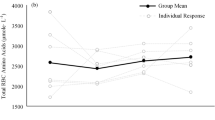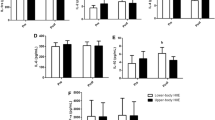Abstract
Glutamine is an essential substrate for the proper functioning of cells of the immune system. Falls in plasma glutamine concentration after exercise may have deleterious consequences for immune cell function and render the individual more susceptible to infection. The purpose of the present study was to examine changes in plasma glutamine concentration (measured using a validated enzymatic spectrophotometric method) following an acute bout of intermittent high-intensity exercise. Eight well-trained male games players took part in the study. Subjects reported to the laboratory following an overnight fast and performed a 1-h cycle exercise task consisting of 20 1-min periods at 100% maximal O2 consumption (V˙O2max) each separated by 2 min of recovery at 30% V˙O2max. Venous blood samples were taken before exercise and at 5 min, 1 h, 2.5 h, 5 h and 24 h post-exercise. Glutamine was measured by enzymatic spectrophotometric determination of the ammonia concentration before and after treatment of the plasma with glutaminase (EC 3.5.1.2). Plasma glutamine concentration did not fall in the immediate post-exercise period [pre-exercise 681 (23) μM compared with 663 (46) μM at 5 min post-exercise, mean (SEM)], but fell to 572 (35) μM at 5 h post-exercise (P < 0.05 compared with pre-exercise). Plasma lactate concentration rose to 8.8 (1.0) mM at the end of exercise and fell to 1.8 (0.4) mM at 1 h post-exercise, but plasma concentrations of free fatty acids and β-hydroxybutyrate both rose substantially in the post-exercise period (to 240% and 400% of pre-exercise levels, respectively). The circulating leucocyte count increased significantly during exercise (P < 0.01), continued to increase in the hours following exercise and peaked at 2.5 h post-exercise (mainly due to a neutrophilia). The fall in the plasma glutamine concentration at 5 h post-exercise could be due to increased renal uptake of glutamine, which generally occurs in conditions of metabolic acidosis or due to a greater removal of glutamine from the plasma resulting from the elevated circulating leucocyte count.
Similar content being viewed by others
Author information
Authors and Affiliations
Additional information
Accepted: 22 October 1997
Rights and permissions
About this article
Cite this article
Walsh, N., Blannin, A., Clark, A. et al. The effects of high-intensity intermittent exercise on the plasma concentrations of glutamine and organic acids. Eur J Appl Physiol 77, 434–438 (1998). https://doi.org/10.1007/s004210050356
Issue Date:
DOI: https://doi.org/10.1007/s004210050356




